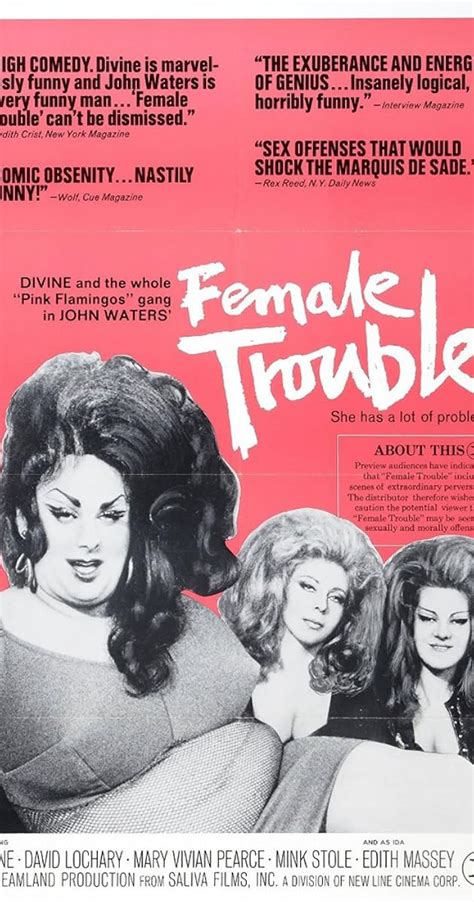Female Trouble

Description:
A dark comedy film about a troubled teenage girl who runs away from home and gets involved in a series of bizarre situations, eventually becoming a notorious criminal and fashion icon. The film explores themes of gender roles, sexuality, and the pursuit of fame.Keywords:
Transgression, Camp, Satire, Counterculture, CrimeWhat is the meaning of Female Trouble?
"Female Trouble," directed by John Waters, explores themes of identity, fame, and societal norms through the story of Dawn Davenport, a troubled young woman who becomes a criminal and model. The title reflects both the chaos in her life and the broader commentary on gender roles, societal expectations, and the pursuit of fame. The film juxtaposes dark humor with provocative themes, highlighting the complexities of femininity and the lengths individuals go to for acceptance and recognition, ultimately critiquing societal values surrounding beauty and success.
Is Female Trouble a sequel to Pink Flamingos?
No, "Female Trouble" is not a sequel to "Pink Flamingos." Both films are directed by John Waters and feature similar themes of transgression and camp, but they are standalone works. "Female Trouble," released in 1974, follows the story of Dawn Davenport, played by Divine, as she navigates her tumultuous life and quest for fame. While both films share a similar aesthetic and sensibility, they do not have a narrative connection.
Who is the baby in Female Trouble?
In the movie "Female Trouble," directed by John Waters, the character of the baby is played by the actress Mink Stole. The film, released in 1974, follows the chaotic life of Dawn Davenport, portrayed by Divine, who is a troubled teenager and later becomes a criminal. The baby represents a part of the absurd and darkly comedic elements that Waters is known for, contributing to the film's exploration of themes related to identity, fame, and societal expectations.
Is Female Trouble a horror movie?
"Female Trouble" is not primarily a horror movie; it is a dark comedy and a cult film directed by John Waters. Released in 1974, it follows the outrageous life of Dawn Davenport, played by Divine, who descends into a world of crime, fame, and chaos. While it features elements of shock and transgression typical of Waters' work, it focuses more on themes of identity, societal norms, and camp rather than traditional horror elements. Its provocative style and satire make it a unique entry in the genre of cult cinema.
Explore More Categories:
Scarcity Excess Mind Control Government Hallucinatory Human Resilience Margaret Thatcher Psychological Horror Teen Collaboration Colorful Social Satire Dual Identity Family Street Racing Legal System Biographical Audacity Prejudice Kumite Disconnectedness Homelessness Character Development Future Film History